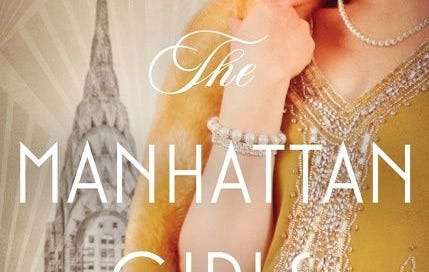The Manhattan Girls: A Novel of Dorothy Parker and Her Friends by Gill Paul (HarperCollins, 2022).
Audiobook read by Lisa Flanagan.
If you’ve been reading this newsletter since the beginning, or even if you’ve just visited the About page, you have some inkling of how I feel about Dorothy Parker, because you know that Dear, Strange Things gets its name from one of her quotes. As a writer, Parker has been an inspiration to me since the first time I read her short piece “The Waltz” in a college textbook. Her voice is unforgettable—fresh, frank, and intimate, sometimes laugh-out-loud funny and sometimes achingly raw beneath the polished prose. I’ve learned more about writing from reading her work than I ever learned from any writer’s guide.
As a person, though, Dorothy Parker—as she admitted herself—was something of a mess. Beneath the sophisticated wit was a hopeless romantic who plunged to fearsome levels of depression when a love affair went wrong. And that happened a lot, because she always seemed to fall for the wrong man. Besides all this, her tongue could be as indiscreet as it was sharp. Though it’s wonderful to be one of her readers, it can’t always have been easy to be her friend.
Gill Paul explores what that must have been like in her new book, The Manhattan Girls: A Novel of Dorothy Parker and Her Friends. Paul’s novel begins in 1921, when Parker and three other women decide to start a bridge club. All of them are regulars at the famous Algonquin Round Table, the group of intellectuals who meet regularly for lunch at the Algonquin Hotel, and all are hungry for success on the city’s cultural scene. Journalist Jane Grant is working with her husband, Harold Ross, to start a magazine that will be known as The New Yorker. Margaret “Peggy” Leech is an aspiring novelist and Winifred Lenihan a promising actress. As the decade passes, the women grow closer, supporting each other through personal and professional triumphs and tragedies.
They especially need to support Dorothy, known here by her nickname “Dottie,” whose life has a way of being both more triumphant and more tragic than anyone else’s. When her alcoholic husband walks out, Dottie dives headfirst into an ill-considered affair with fellow writer Charlie MacArthur, which only makes things go from bad to worse. Much, much worse. “Strange she was so astute in her writing,” Winifred reflects, “yet couldn’t see what was right in front of her nose.”
The Manhattan Girls is an absorbing story, with lovingly detailed characters who suck you in. It has all the glamorous trappings you could want in a novel of New York in the 1920s: speakeasies and parties, gorgeous gowns, battles of wits, the works. It also has women struggling to deal with timeless problems, like what to do about powerful men who won’t take no for an answer. And—be warned—it has some brief but harrowing descriptions of suicide attempts, rape, and abortion. Frankly, it can be devastating to watch what these women go through (or to listen to it, in my case—I went with the audiobook, very well read by Lisa Flanagan). But their troubles make you root all the more for them to turn their lives around and realize their hopes.
As for historical accuracy—well, that’s hit and miss. The secondary characters tend to fare better in this regard: Robert Benchley’s kindness, Alexander Woollcott’s venom, and Harold Ross’s workaholic ways are painted in broad strokes and are pretty much true to life. But a few of the choices Paul makes for her main quartet of women are puzzling. (Warning: spoiler in the next paragraph! Skip down to the paragraph below if you don’t want to see it.)
She sometimes has Peggy Leech, for instance, spouting 21st-century jargon and views. And she has Winifred Lenihan end up in a romantic relationship with fellow actress Eva Le Gallienne. But if you go searching, you’ll find that the only connection between the two women—the only one that’s out there on the Internet, at least—is that Lenihan denounced Le Gallienne as a Communist! Unless Paul has access to some secret trove of letters or out-of-print biography showing that this was revenge for a bad breakup, I can’t think of a more bizarre choice of love interest. It’s the kind of thing that’s liable to get you haunted by the ghost of an angry actress.
(Also, fellow Dorothy Parker fans will know that it’s just simply unfair to mention A.A. Milne and then not give Dottie a chance to take potshots at him!)
So if you’re a stickler for accuracy in your historical fiction, you might find some of Paul’s choices bothersome. If you’re not, you may just enjoy The Manhattan Girls as an interesting story about some very interesting women. But in any case, you should read Dorothy Parker. Her life may have been chaotic, but her writing is suffused with liveliness, poignancy, and brilliance that transcend it all.
Book Links:
The Manhattan Girls on Amazon
The Manhattan Girls on Bookshop
The Manhattan Girls on Audible




I found your review spot on--the characters were interesting and as an avid reader of The New Yorker for many years, the back story was enlightening. But you also nailed the negative elements well--especially about the Winifred romance--it felt like "Oh, I must include a same-sex romance so this will be it even though there is nothing to support this choice"--and Peggy's 21st century expressions. But all in all I enjoyed the book and will look for more books by Gill Paul.